Story Highlights
- Most say lawmakers corrupt, out of touch, favor special interests
- Record 48% say their own representative is out of touch
- Record 32% say their own member is corrupt
However the likely drama over how to fund the government past Sept. 30 unfolds, most Americans appear to have little faith in most lawmakers to do the right thing. Majorities believe that most members of Congress are "out of touch with average Americans" (79%), "focused on the needs of special interests" rather than the needs of their constituents (69%) and corrupt (52%). Americans are less critical of their own representatives, but substantial percentages say their own member of Congress is out of touch (48%), focused on special interests (47%) and corrupt (32%).
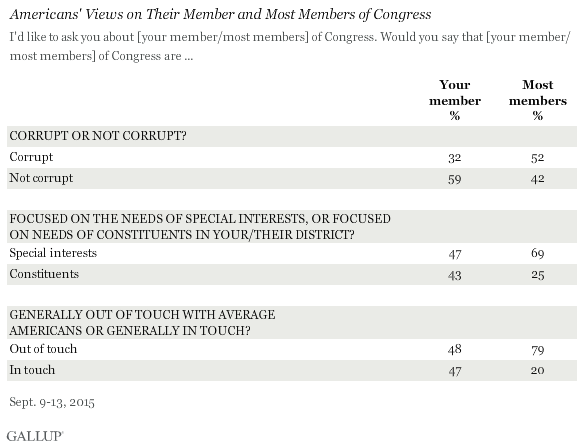
These results come from Gallup's annual Governance poll, conducted Sept. 9-13. By any measure, Congress is not a popular or trusted institution among Americans. The body's current approval rating, 14%, is typical of its ratings over the past several years. Earlier this year, Gallup found that fewer than one in 10 Americans (8%) have a great deal or quite a lot of confidence in Congress.
Traditionally, Americans have been less critical of their own members of Congress, but last year the percentage of U.S. adults saying their own representative deserved re-election dropped to a record low. These uneasy feelings Americans have for Congress may be exacerbated in the coming days, as the prospect of a government shutdown looms. House Speaker John Boehner's unexpected resignation on Friday highlights how acrimonious congressional divisions have become, leading the House speaker to step down well before his term ends. Speculation is rampant that Boehner's resignation may actually be the action that prevents a government shutdown this week. But if this is true, it could confirm some of Americans' worst impressions of Congress, as it would suggest that simple legislative functions, such as funding the federal government, are enough to thrust the House into leadership turmoil.
Americans Grow More Skeptical of Own Representatives
Gallup has asked these sets of questions in five polls since 1994, providing a glimpse into how Americans have assessed Congress on these dimensions across distinct political periods.
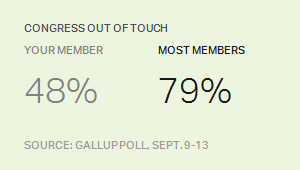
U.S. adults today are more likely to see Congress as focused on the needs of special interests than they were in 1994. Meanwhile, Americans are slightly more likely today to say their own member of Congress is focused on special interests than on constituents' needs. This year's 47% is nominally the highest figure on record, and up seven percentage points from 2006.
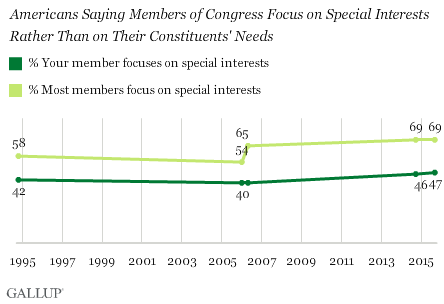
Americans' views have fluctuated on whether most members of Congress are corrupt. In October 1994 -- on the eve of a historic Republican wave that swept out many long-serving, powerful congressional Democrats -- half of Americans saw most federal lawmakers as corrupt. This fell to 38% in early 2006, but has now climbed back to 52%. Relatedly, Gallup recently found that 75% of Americans perceive corruption to be widespread in the government in general. Nearly a third of Americans (32%) today say their member of Congress is corrupt, 10 points higher than in 2006.
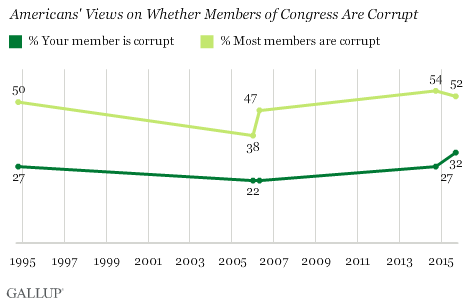
Over the past five surveys, roughly three in four Americans have judged most members of Congress to be out of touch with average Americans, including 79% this year. The public is more likely to view local members of Congress as in touch, but nearly half (48%) this year say their member of Congress is out of touch, higher than in 2006 (38%) or 1994 (41%).
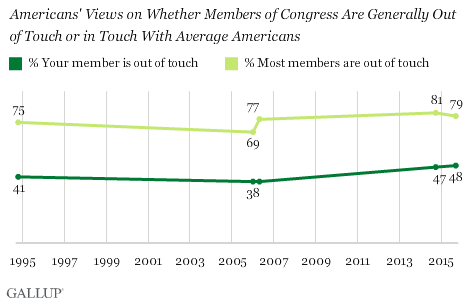
Bottom Line
Majorities of Americans view most members of Congress as corrupt, beholden to special interests and out of touch. This is not new and perhaps not even surprising, given the low esteem in which Americans hold the institution. But this cynicism is beginning to influence Americans' views of their own federal representatives, not just the national legislature. Record or near-record numbers of U.S. adults say their local representative is out of touch and focused on serving special interests rather than their constituents.
Congress is under greater-than-usual stress, with the House speaker's abrupt resignation and a possible government shutdown. Numerous members of Congress have cast this battle as a principled one, even if it results in disruptive outcomes such as a shutdown, or, as is apparently the case, the abrupt resignation of the top lawmaker in the House. But given the large proportion of Americans who believe members of Congress have far less altruistic motives, it is doubtful many Americans will see the showdown as a dispute over how best to serve the nation's interests.
Historical data are available in Gallup Analytics.
Survey Methods
Results for this Gallup poll are based on telephone interviews conducted Sept. 9-13, 2015, with a random sample of 1,025 adults, aged 18 and older, living in all 50 U.S. states and the District of Columbia. For results based on the total sample of national adults, the margin of sampling error is ±4 percentage points at the 95% confidence level. All reported margins of sampling error include computed design effects for weighting.
Each sample of national adults includes a minimum quota of 60% cellphone respondents and 40% landline respondents, with additional minimum quotas by time zone within region. Landline and cellular telephone numbers are selected using random-digit-dial methods.
Learn more about how Gallup Poll Social Series works.

